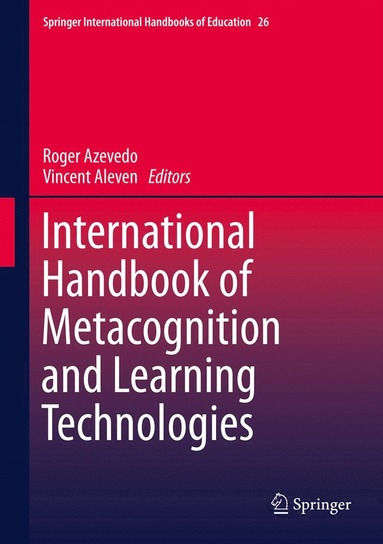
- Format
- Inbunden (Hardback)
- Språk
- Engelska
- Serie
- Springer International Handbooks of Education (del 28)
- Antal sidor
- 721
- Utgivningsdatum
- 2013-04-23
- Förlag
- Springer-Verlag New York Inc.
- Dimensioner
- 261 x 183 x 46 mm
- Vikt
- ISBN
- 9781441955456
- 1553 g
International Handbook of Metacognition and Learning Technologies
- Skickas från oss inom 5-8 vardagar.
- Fri frakt över 249 kr för privatkunder i Sverige.
Passar bra ihop
De som köpt den här boken har ofta också köpt Let Them Theory av Mel Robbins (inbunden).
Köp båda 2 för 5914 krKundrecensioner
Fler böcker av författarna
-
Computers as Metacognitive Tools for Enhancing Learning
Roger Azevedo
-
Unobtrusive Observations of Learning in Digital Environments
Vitomir Kovanovic, Roger Azevedo, David C Gibson, Dirk Lfenthaler, Dirk Lfenthaler
-
Unobtrusive Observations of Learning in Digital Environments : Examining Behavior, Cognition, Emotion, Metacognition and Social Processes Using Learni
Vitomir Kovanovic, Roger Azevedo, David C Gibson
-
Intelligent Tutoring Systems
Roger Nkambou, Roger Azevedo, Julita Vassileva
Övrig information
Roger Azevedo is an Associate Professor in the Department of Psychology and an affiliated member of the Institute for Intelligent Systems (IIS) at The University of Memphis. He is currently the Director of the Cognitive Psychology Area in the Department of Psychology and the Director of the Cognition and Technology Research Laboratory (azevedolab.autotutor.org). In 1998 he received his Ph.D. in Educational Psychology from McGill University. He did his postdoctoral training in the Department of Psychology at Carnegie Mellon University. Dr. Azevedo then earned a faculty appointment in the Department of Human Development at the University of Maryland. His primary research interests are in cognitive science, human learning and performance, and the learning sciences. More specific interests include metacognition and self-regulated learning, complex learning, human and computerized tutoring, intelligent computer-based learning environments, and education. He is an associate editor of the Journal of Educational Psychology and serves on the editorial board of six top-tiered international journals including Metacognition and Learning, Educational Psychologist, Educational Psychology Review, and Instructional Science. He reviews papers and performs committee functions for the American Educational Research Association, International Society of Artificial Intelligence in Education, International Society of the Learning Sciences, American Psychological Association, and European Association for Research on Learning and Instruction. He has received several research awards, including an NSF Early Career Grant and Educational Technology Research & Development's 2008 outstanding journal article. He is also the recipient of several NSF and NIH grants that focus on metacognition, SRL, and complex science topics with learning technologies. Dr. Azevedo is an advisory board member for the Pittsburgh Science of Learning Center (PSLC) and a regular panel member for theInstitute of Education Sciences and National Science Foundation. In addition to publishing over 100 articles in journals, books, and conference proceedings, he has (co-)edited five special issues of key journals in the learning and cognitive sciences. He has played a major role in bringing in to the University of Maryland and the University of Memphis over $7 million in grant funding during the last ten years as either PI or co-PI. He has designed, developed, and tested advanced computerized, intelligent learning environments for medical and biological sciences including the RadTutor, SICUN tutor, CircSysWeb, and MetaTutor. Vincent Aleven is (as of July 1, 2009) an Associate Professor in Carnegie Mellon's Human-Computer Interaction Institute, and has over 17 years of experience in research and development of educational software based on cognitive science theory, with a focus on intelligent tutors for middle-school and high-school mathematics. His research has been published in journals such as Cognitive Science, Review of Educational Research, Educational Psychology Review, the International Journal on Artificial Intelligence and Education, and Artificial Intelligence. In a number of projects, he has demonstrated that intelligent tutor functionality can effectively support metacognition. He demonstrated empirically that students learn better when the tutor supports metacognition in the form of self-explanation; improvements developed in this research project were incorporated into Carnegie Learning's Cognitive Tutor Geometry?, which is used daily in hundreds of U.S. schools. In research focused on a different metacognitive skill, help seeking, Aleven and colleagues showed that a tutor agent based on a detailed computer model of help seeking can lead to lasting improvement in students' help-seeking behavior with tutoring software. In other research, he and colleagues have created the CTAT authoring tools that enable non-programmersto create tutors much more cost-effectively than...
Du kanske gillar
-
Atomic Habits
James Clear
Trade paperback (UK) -
Man and His Symbols
C G Jung
Häftad -
The Creative Act
Rick Rubin
Inbunden


